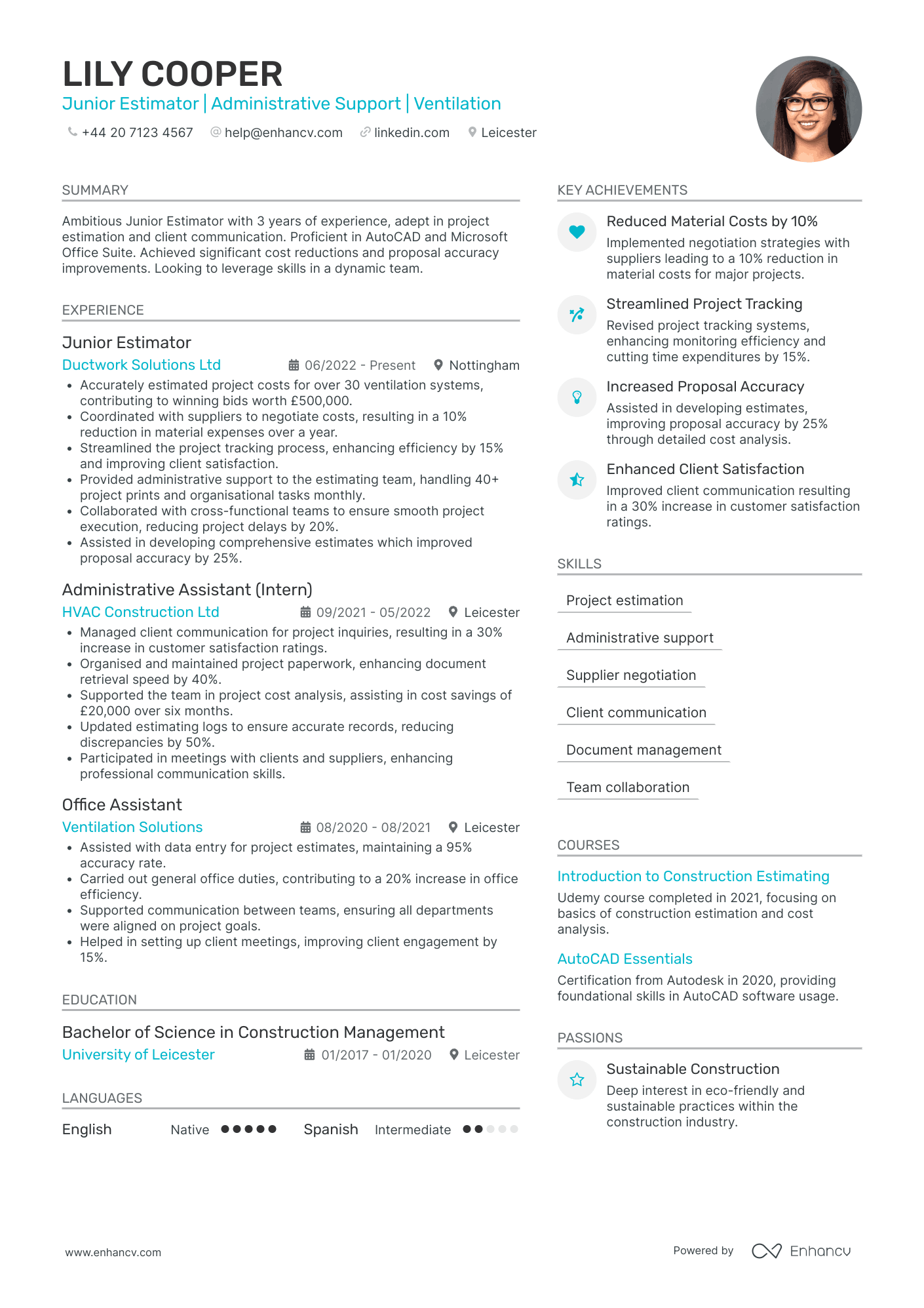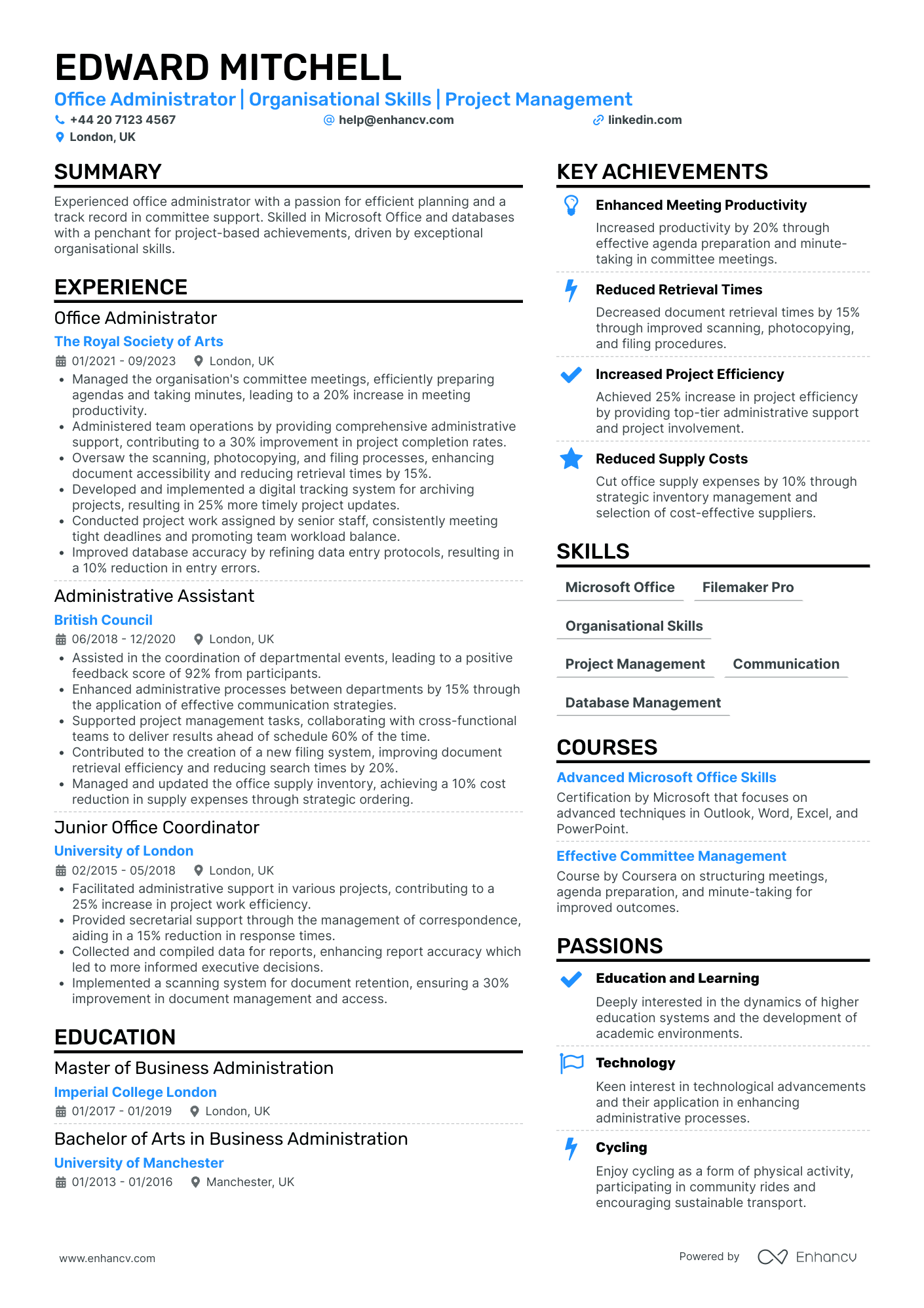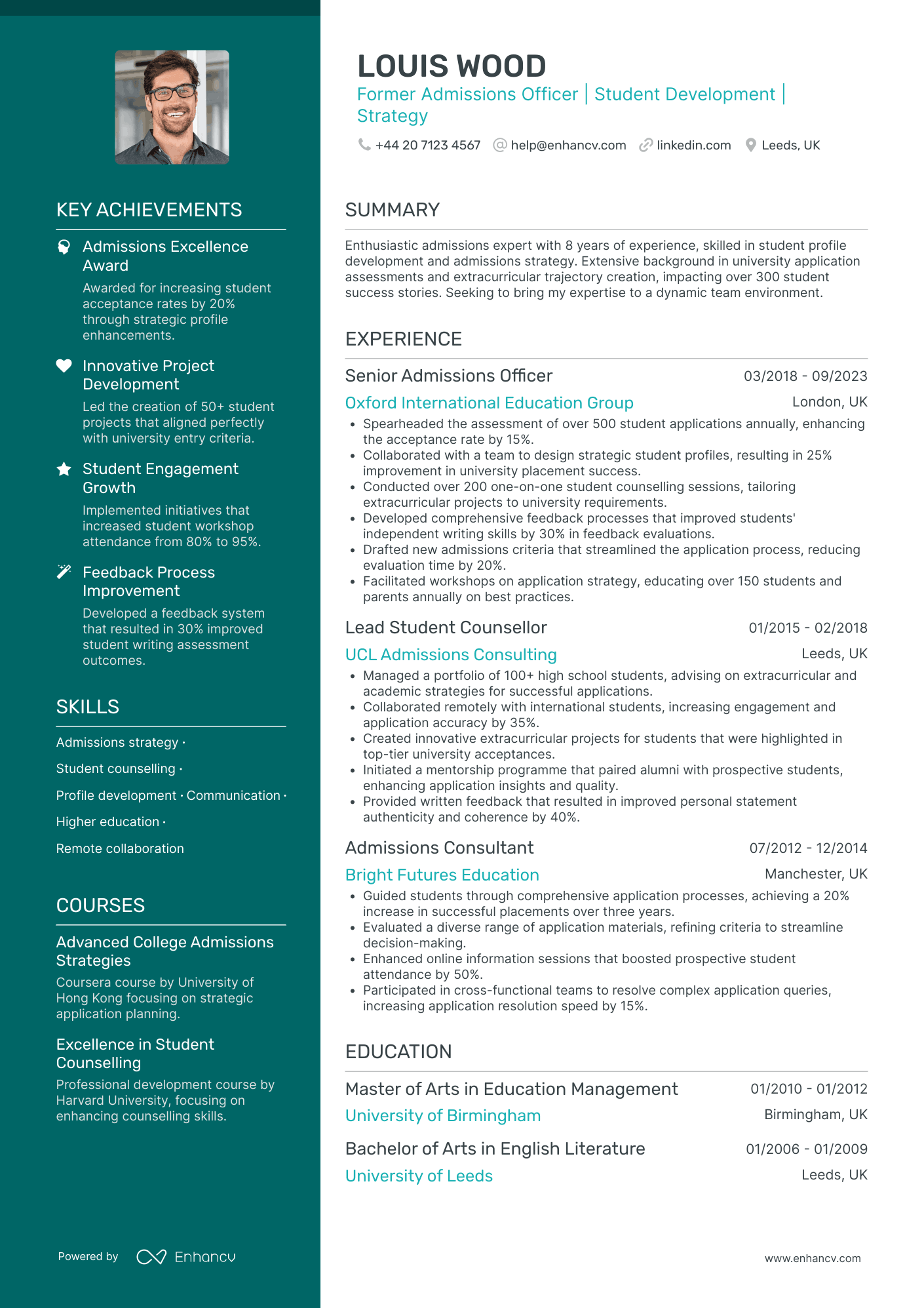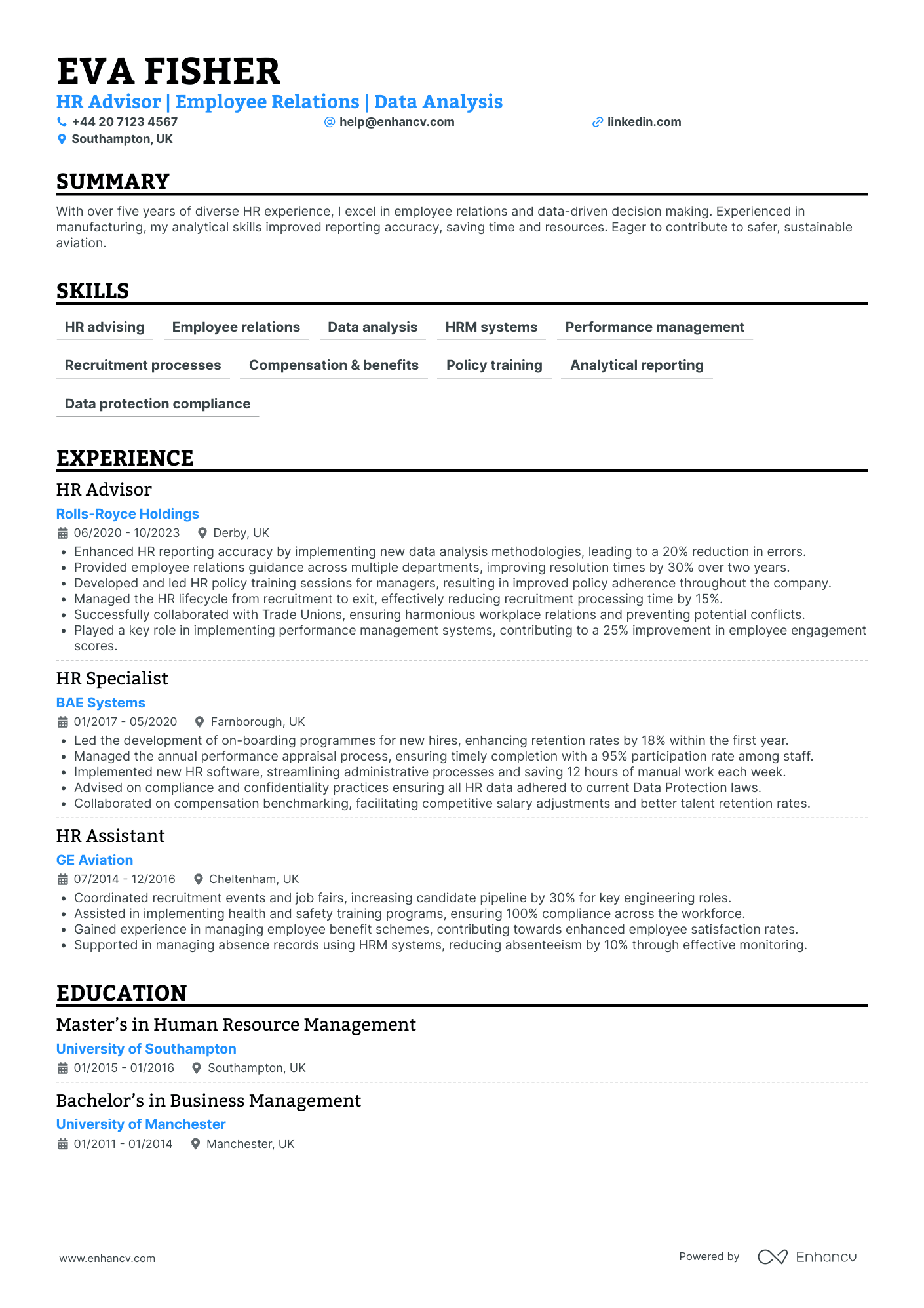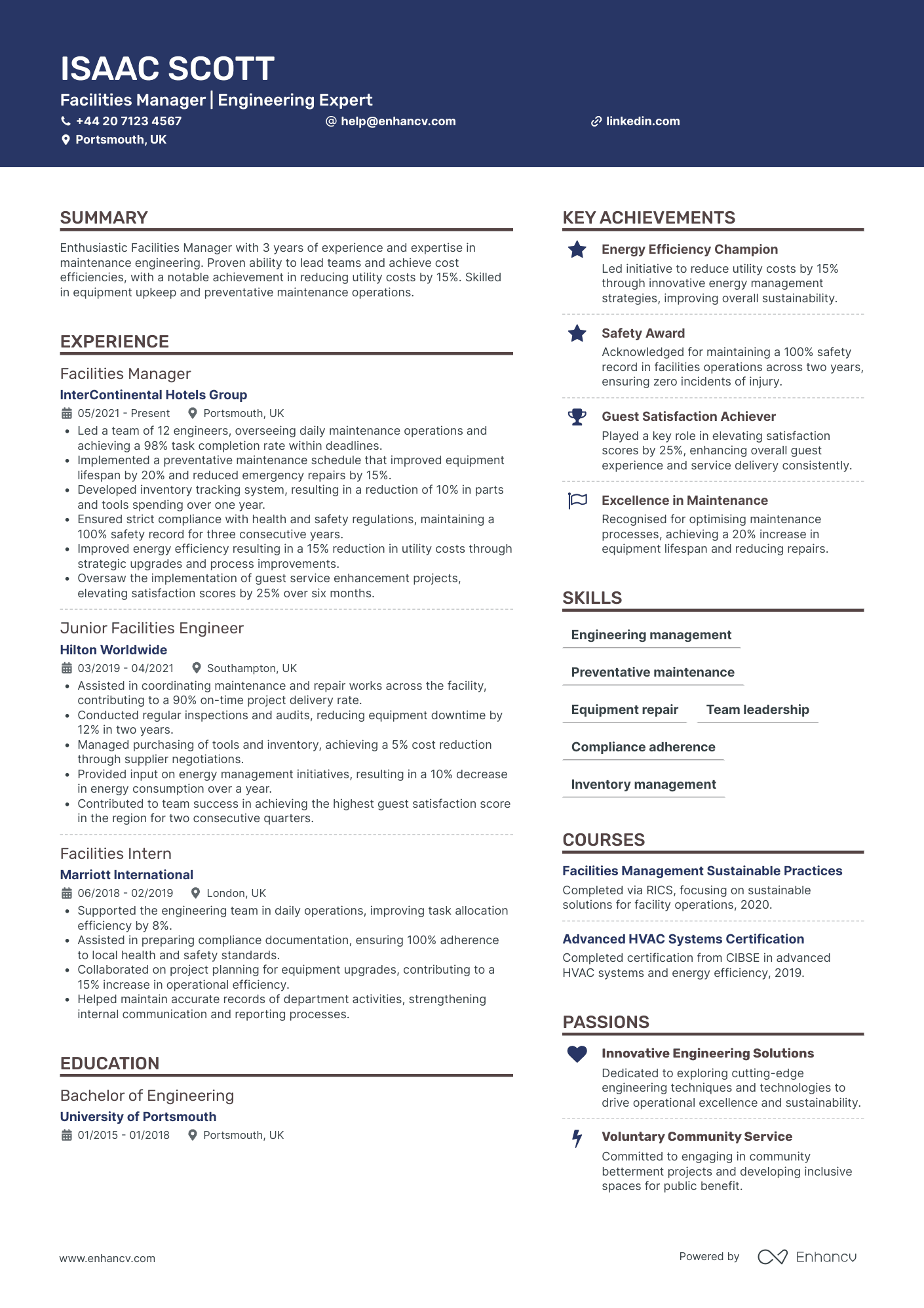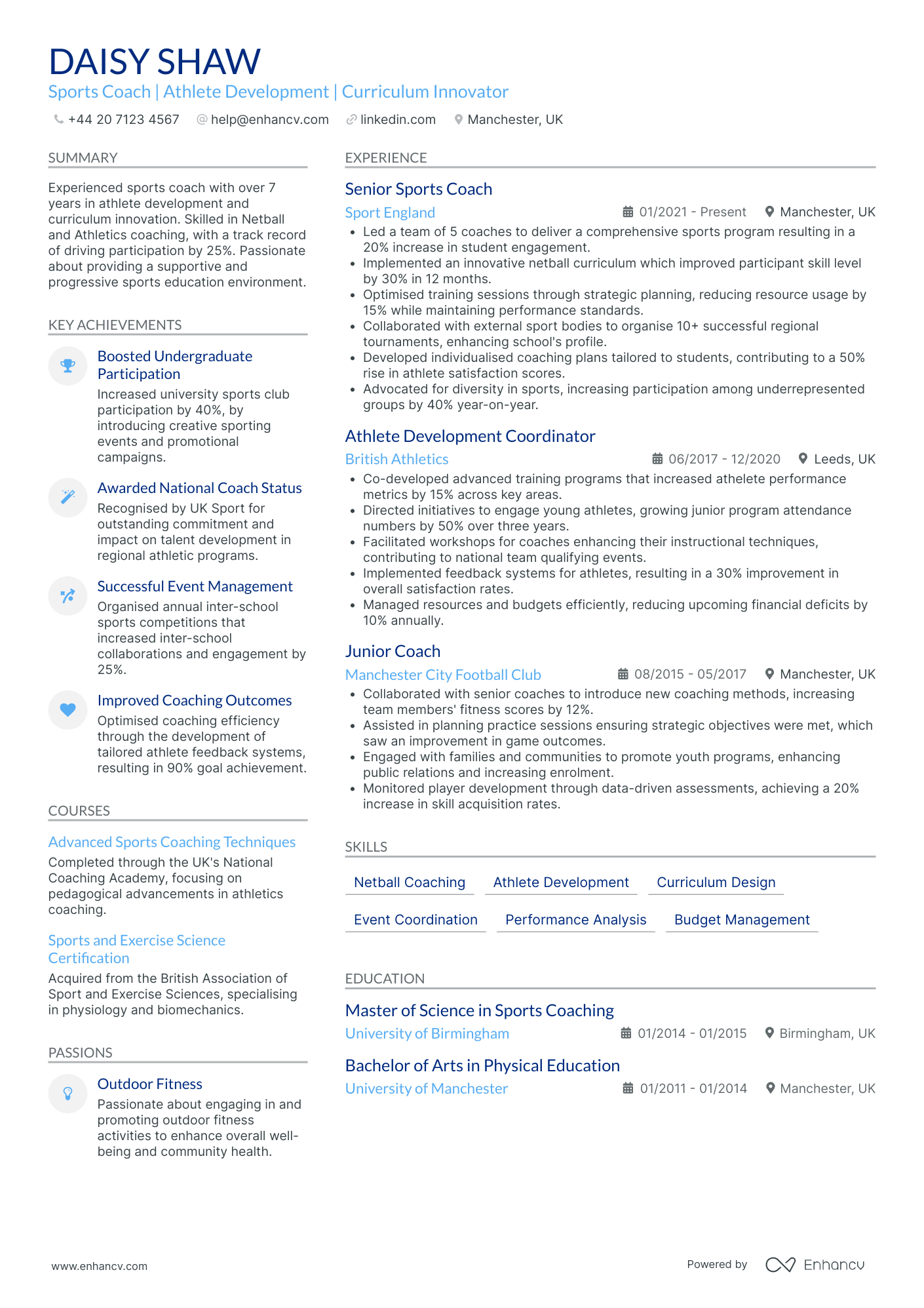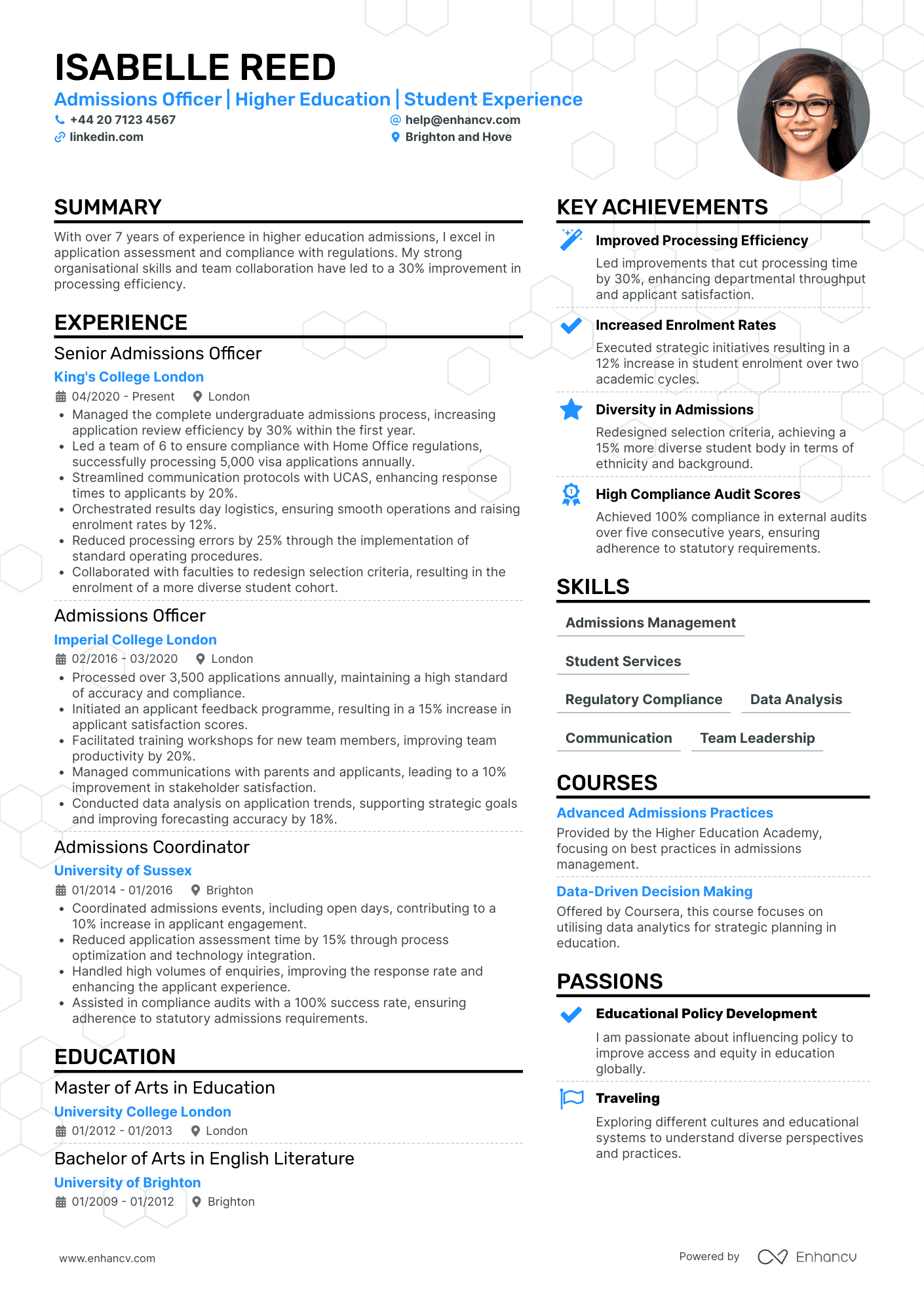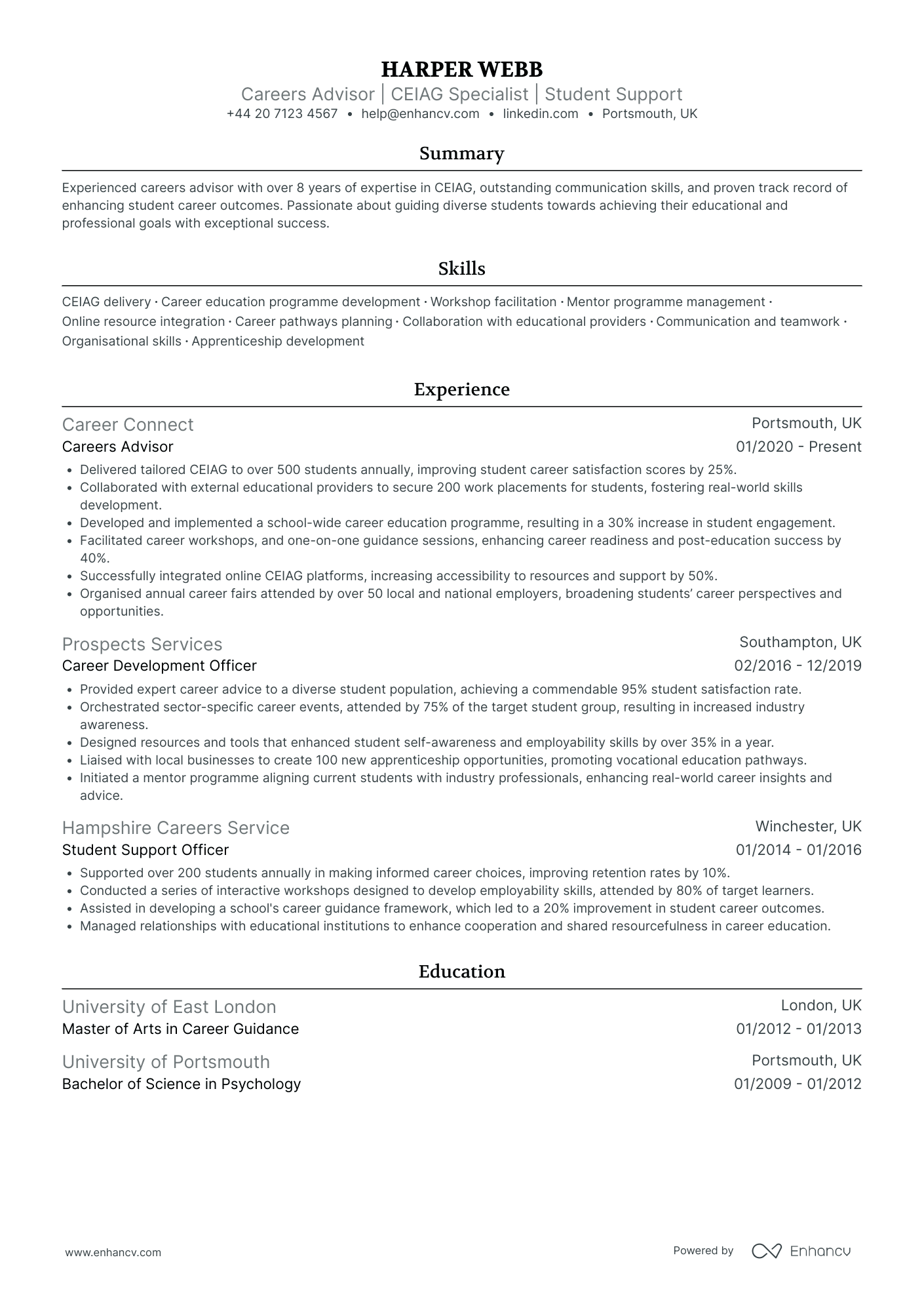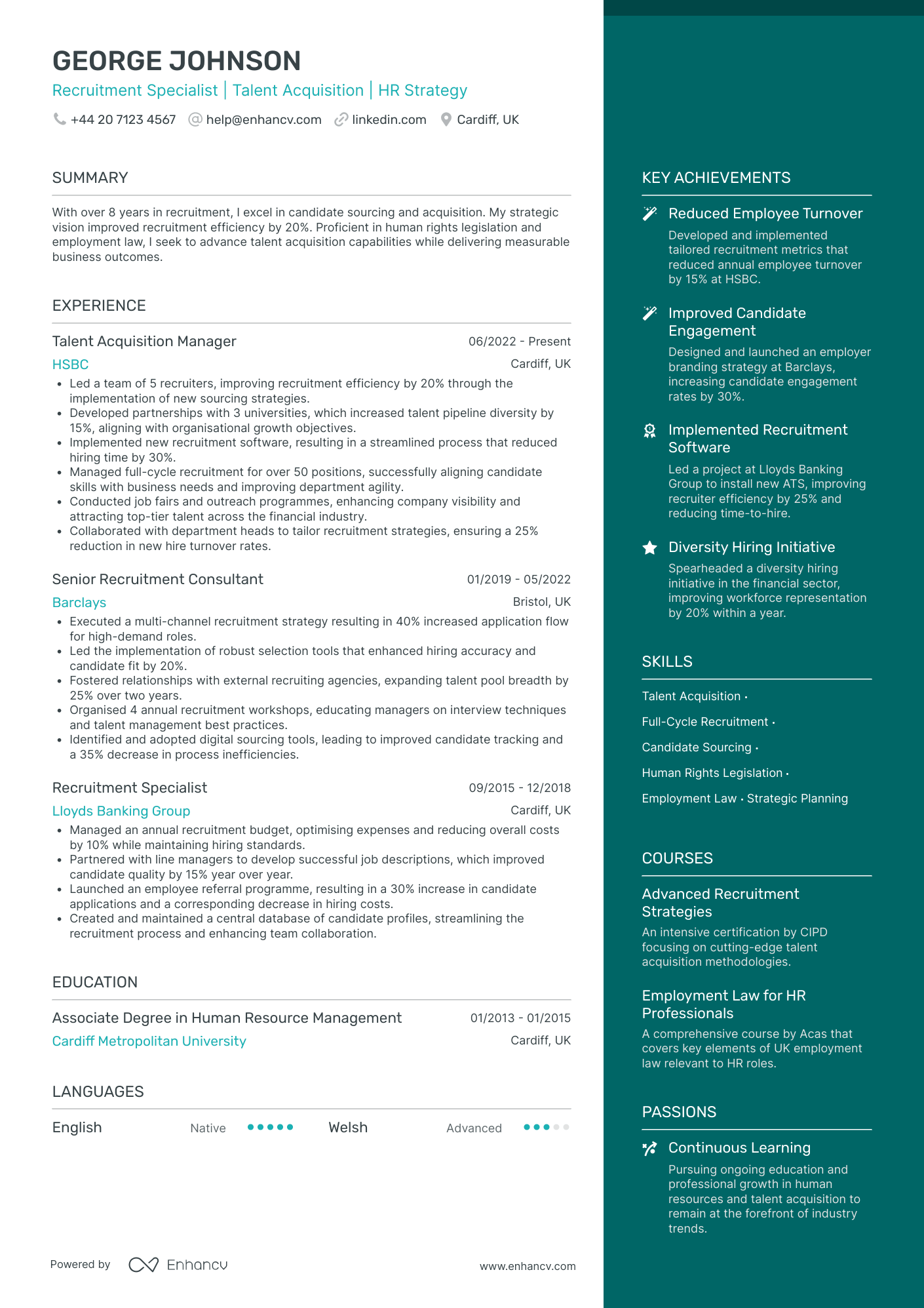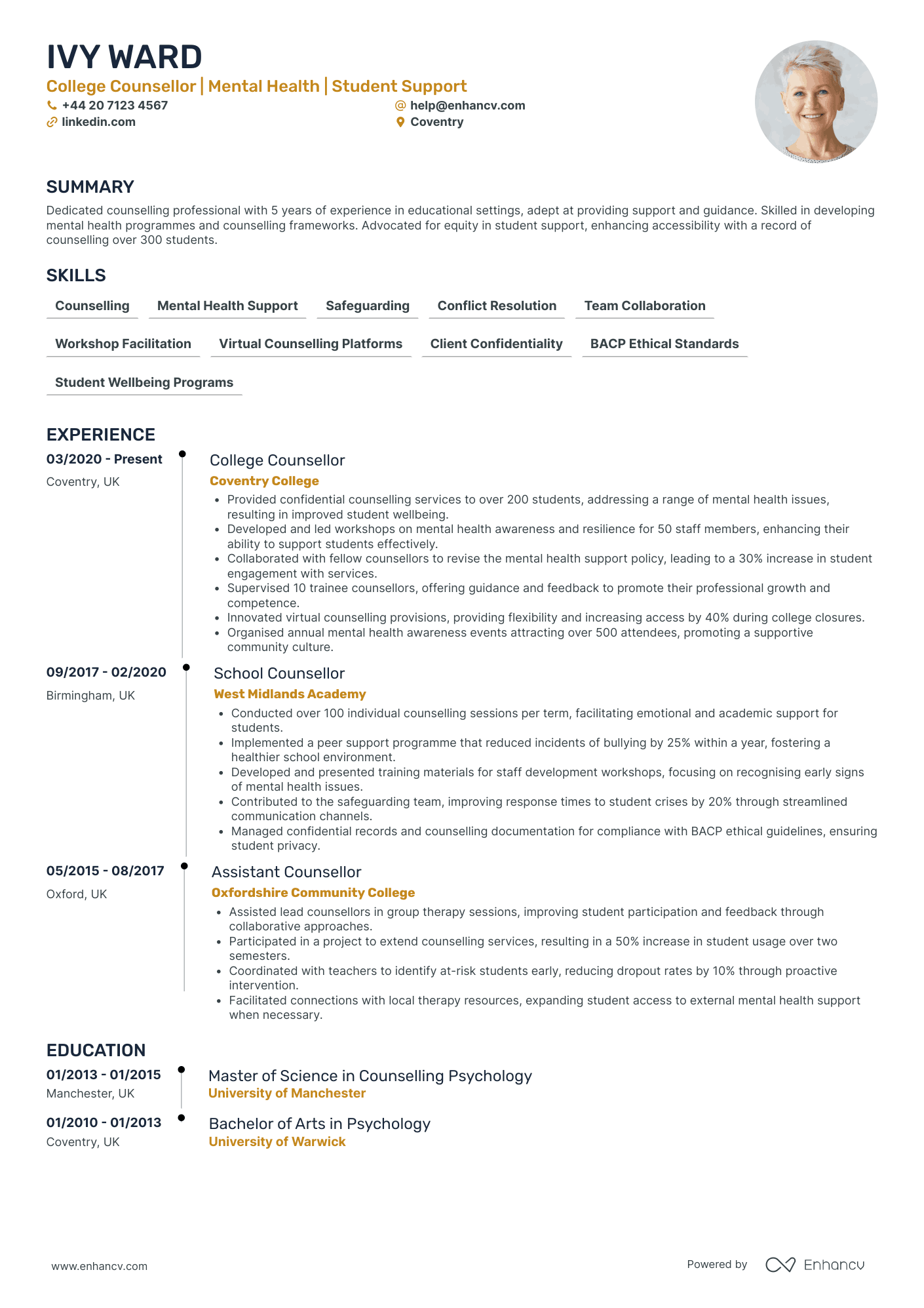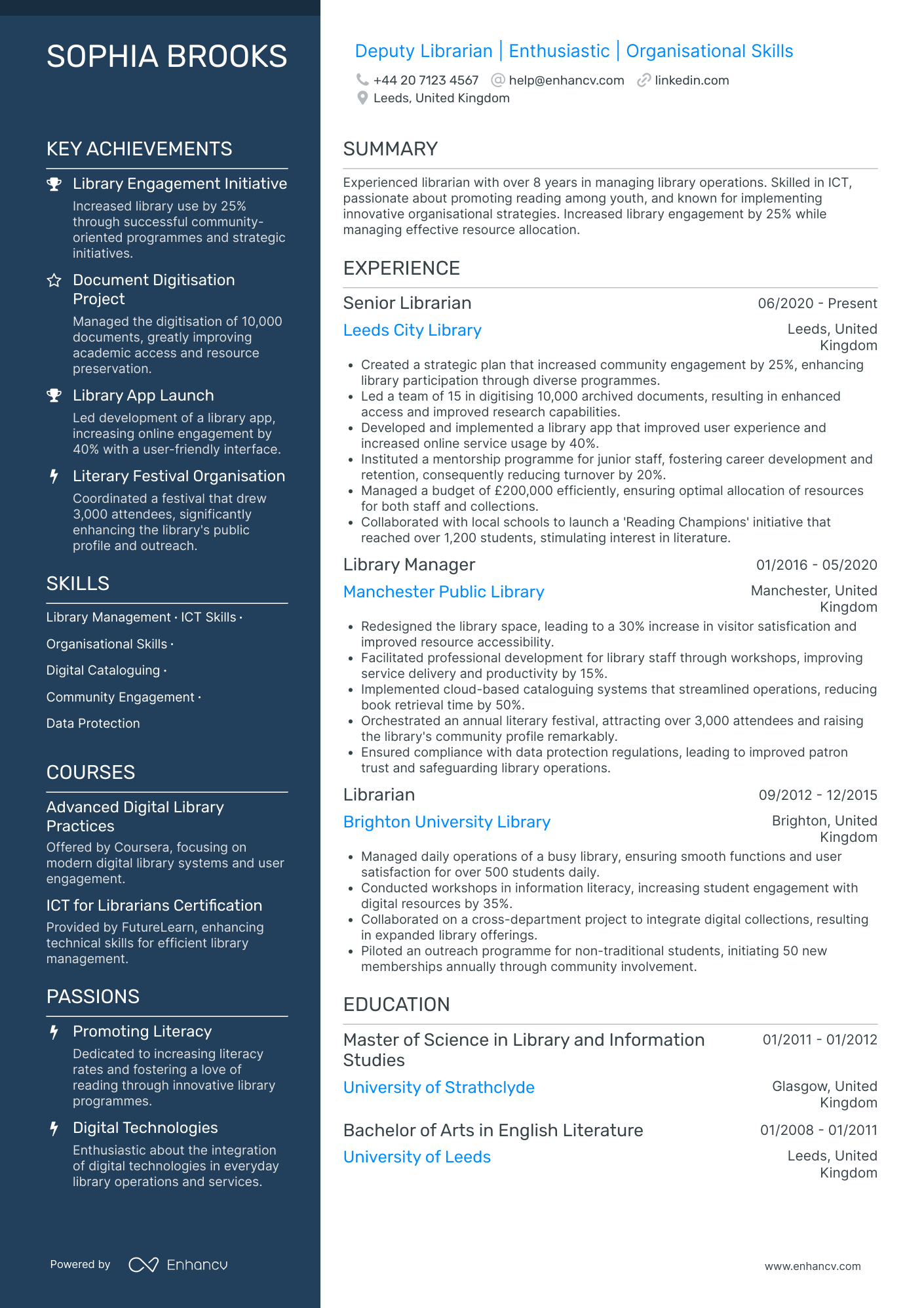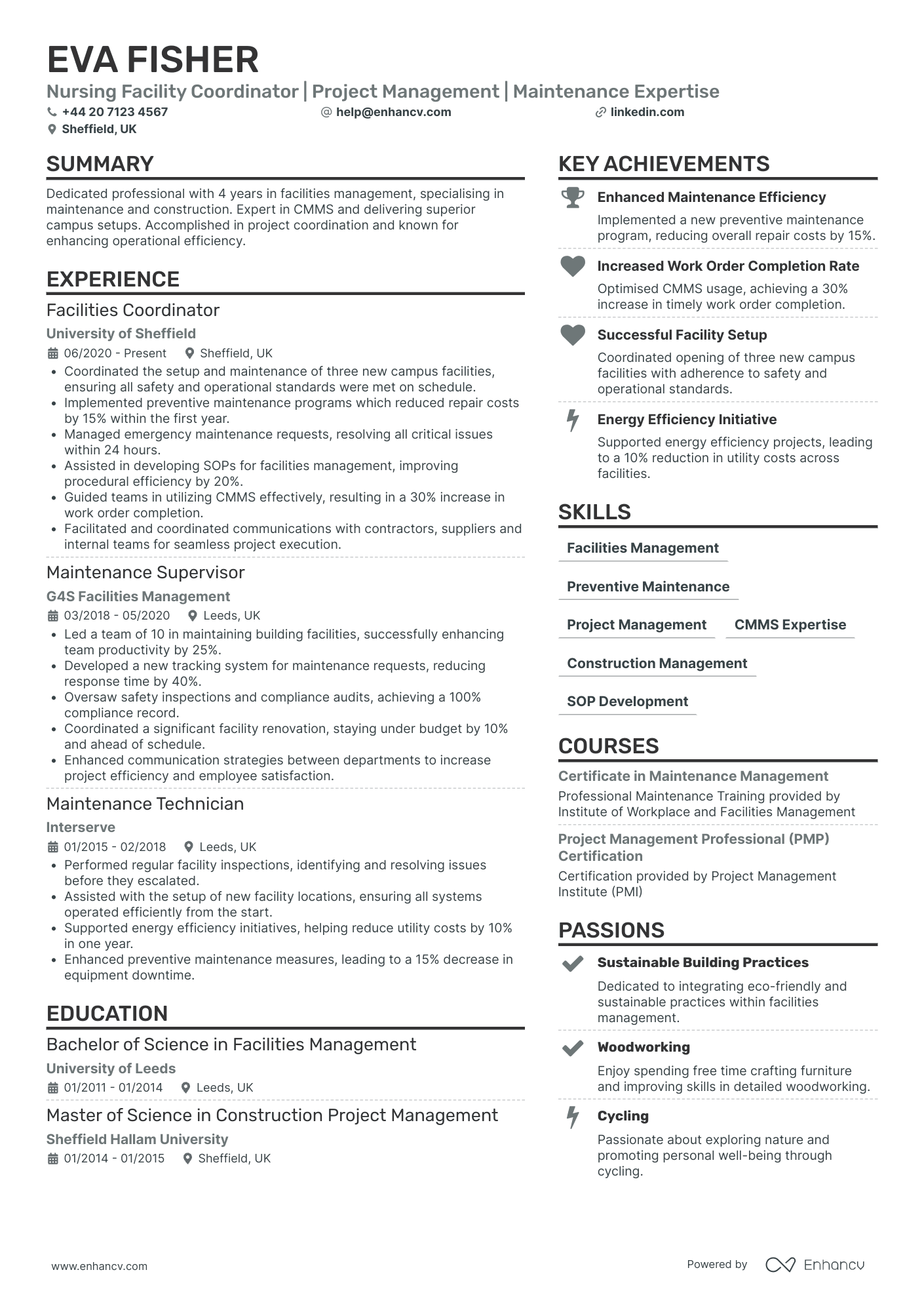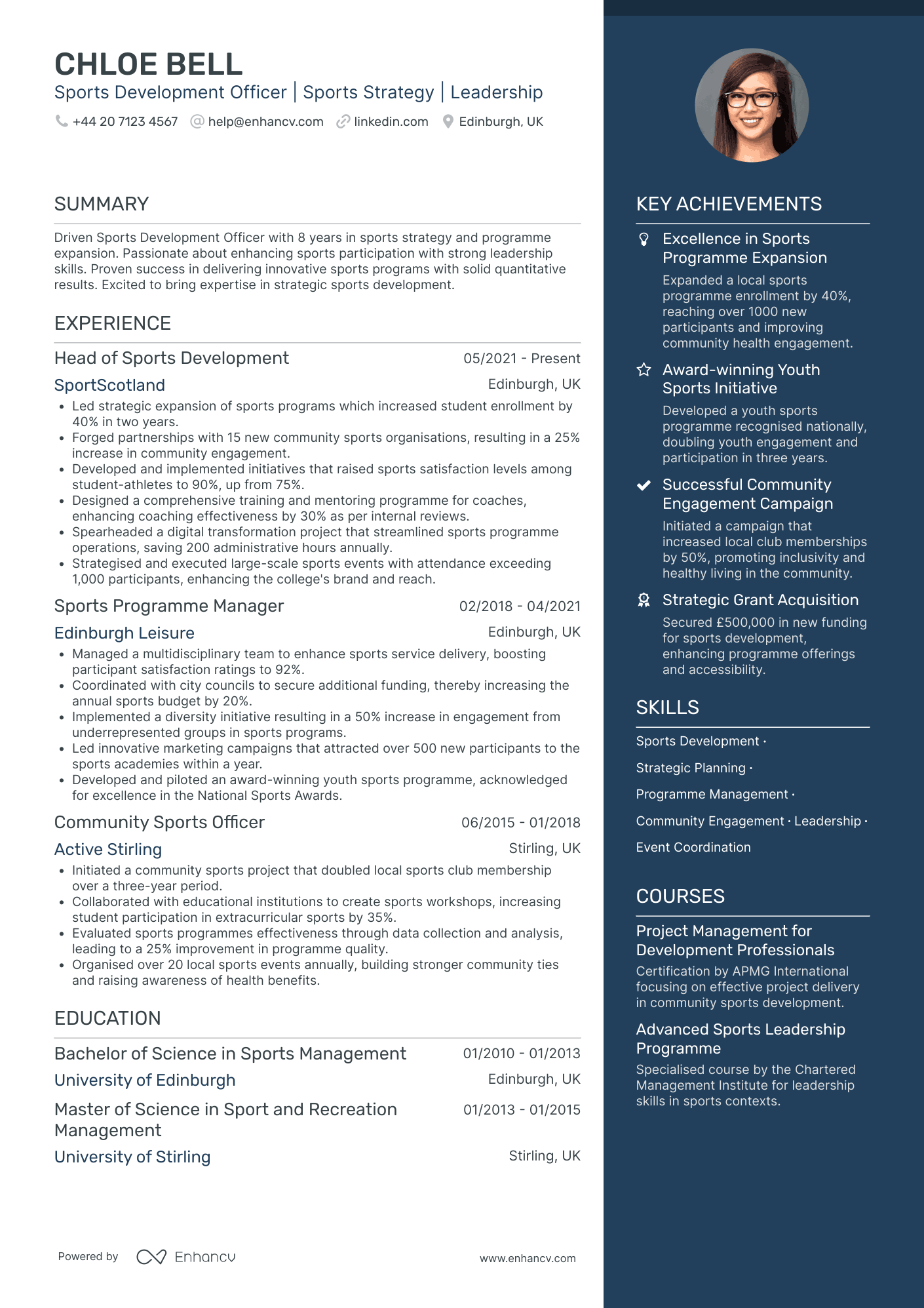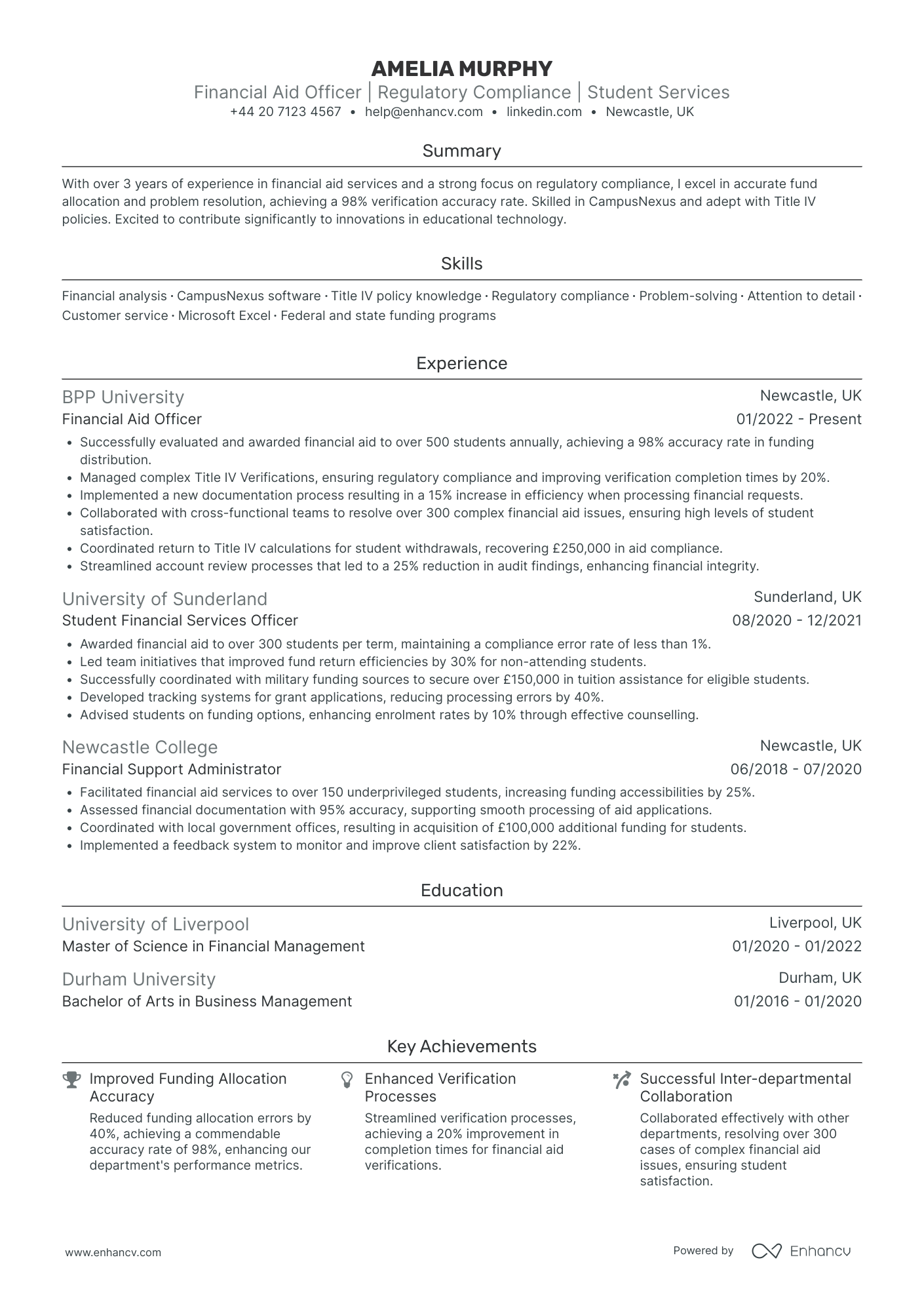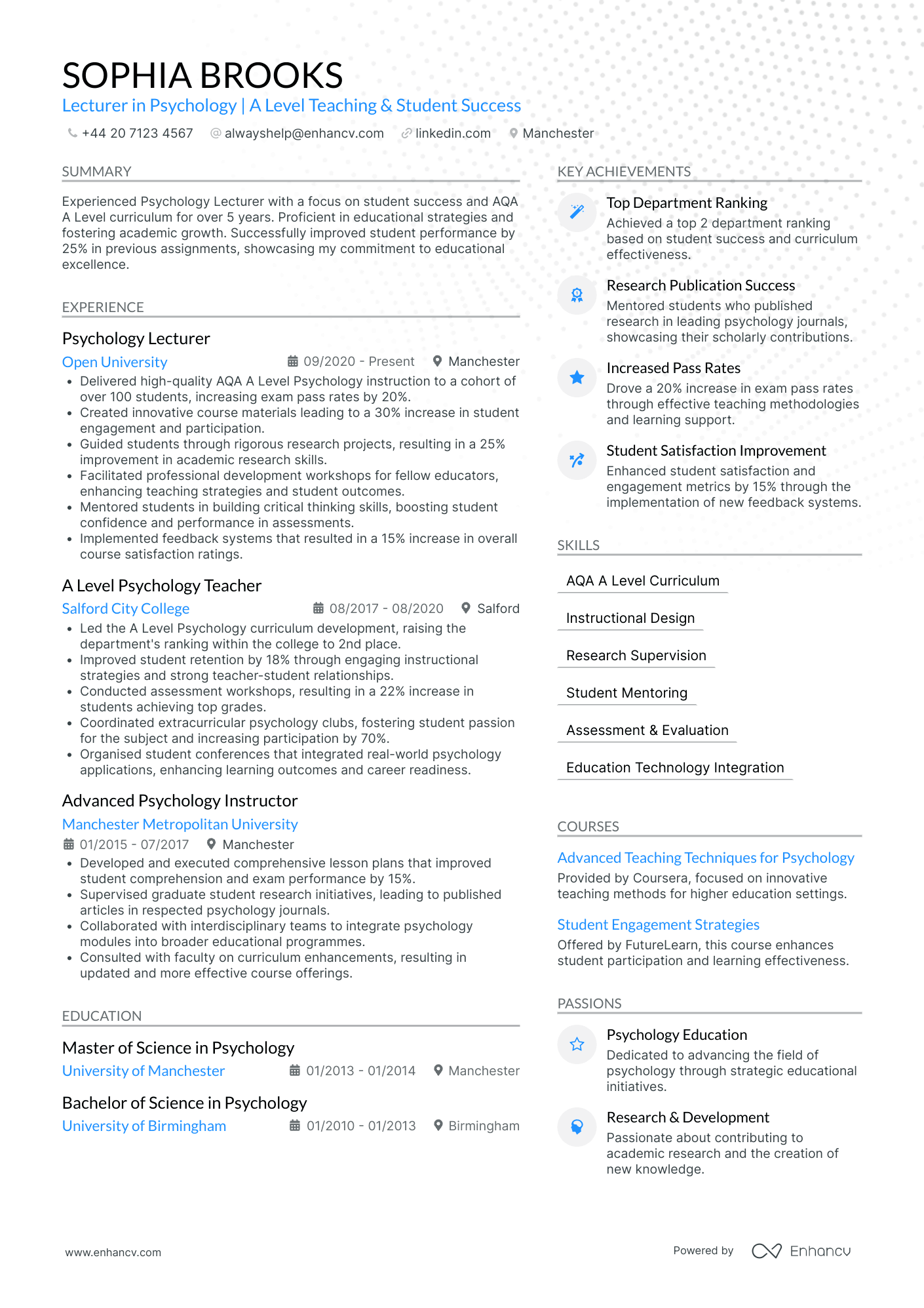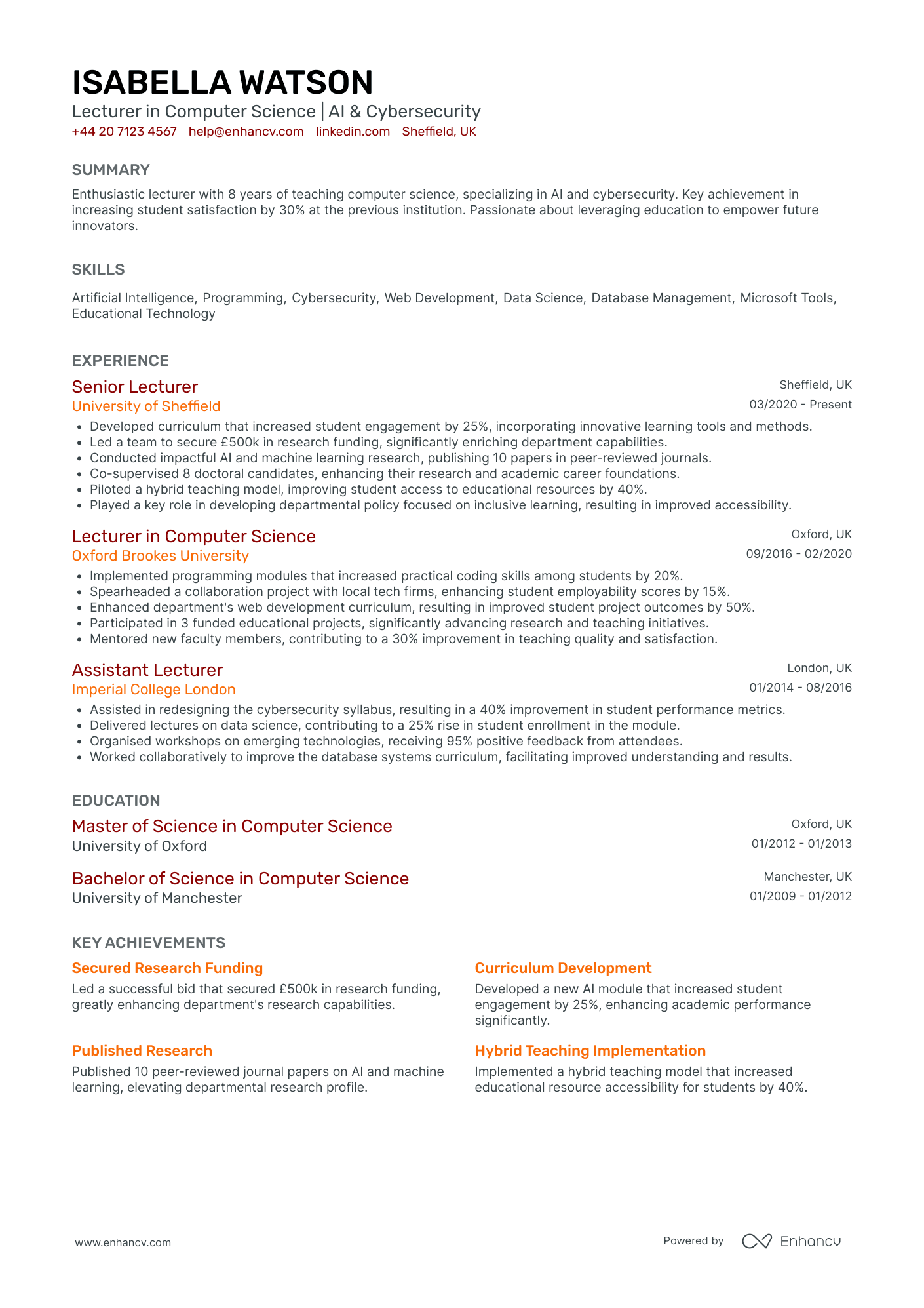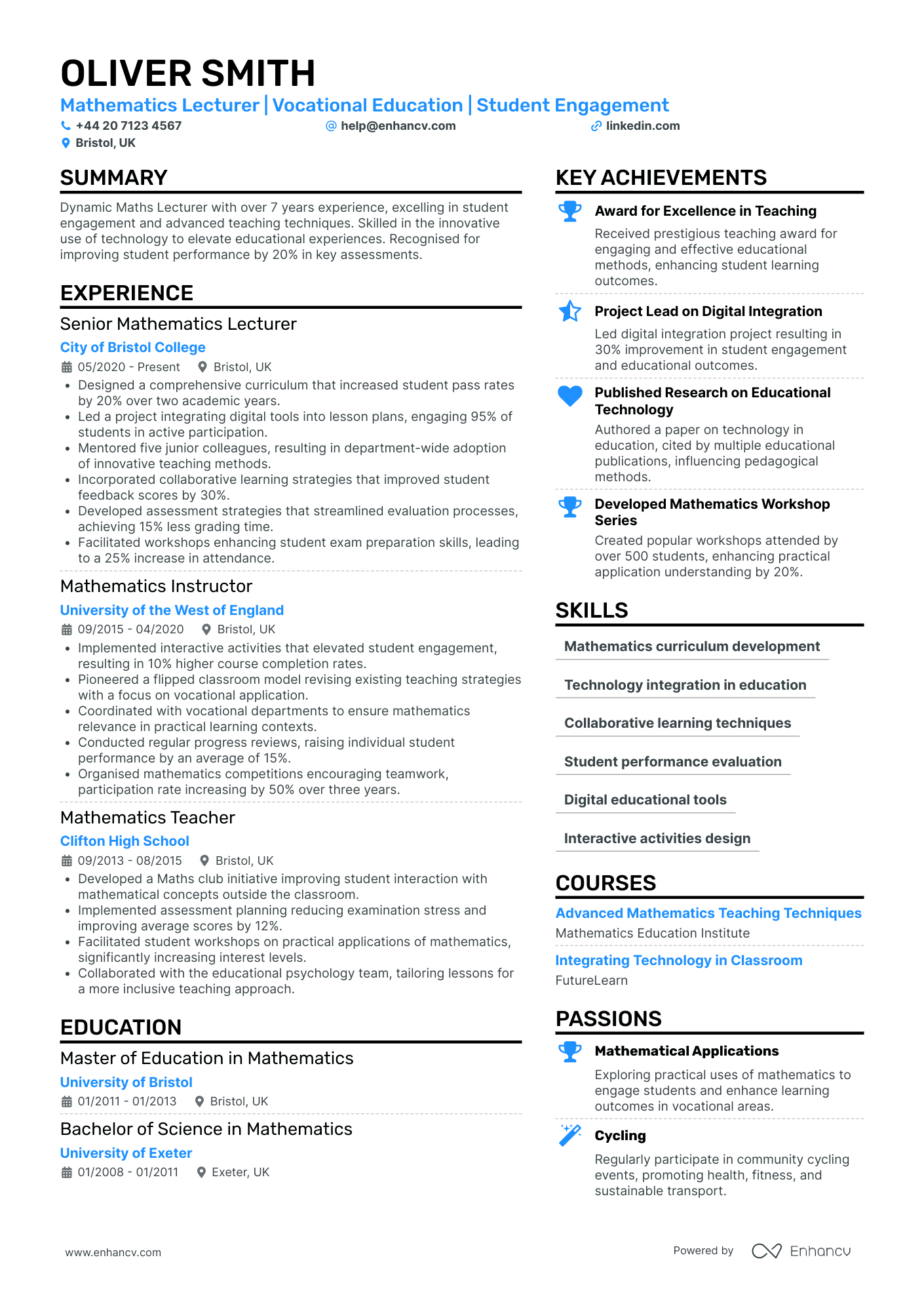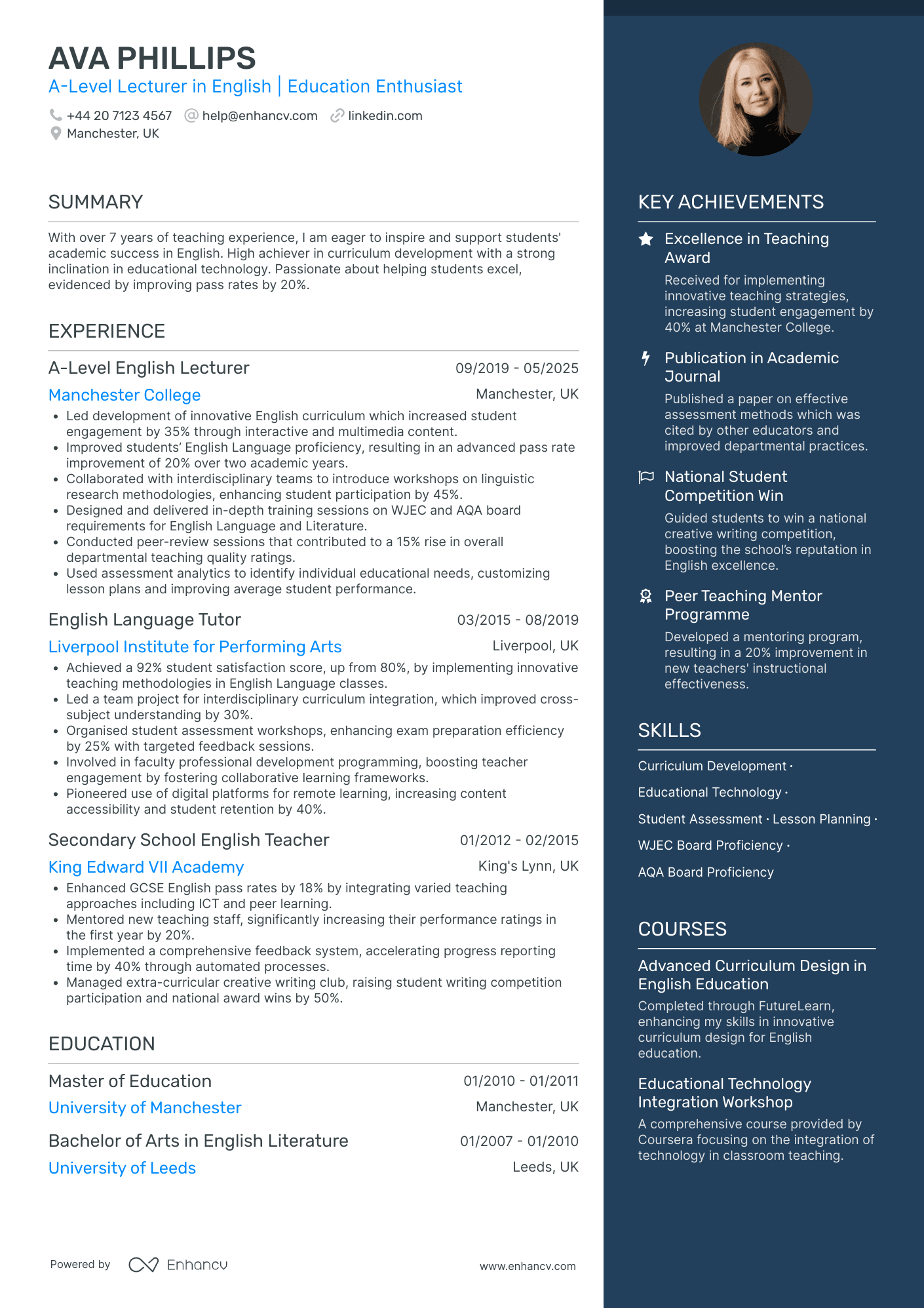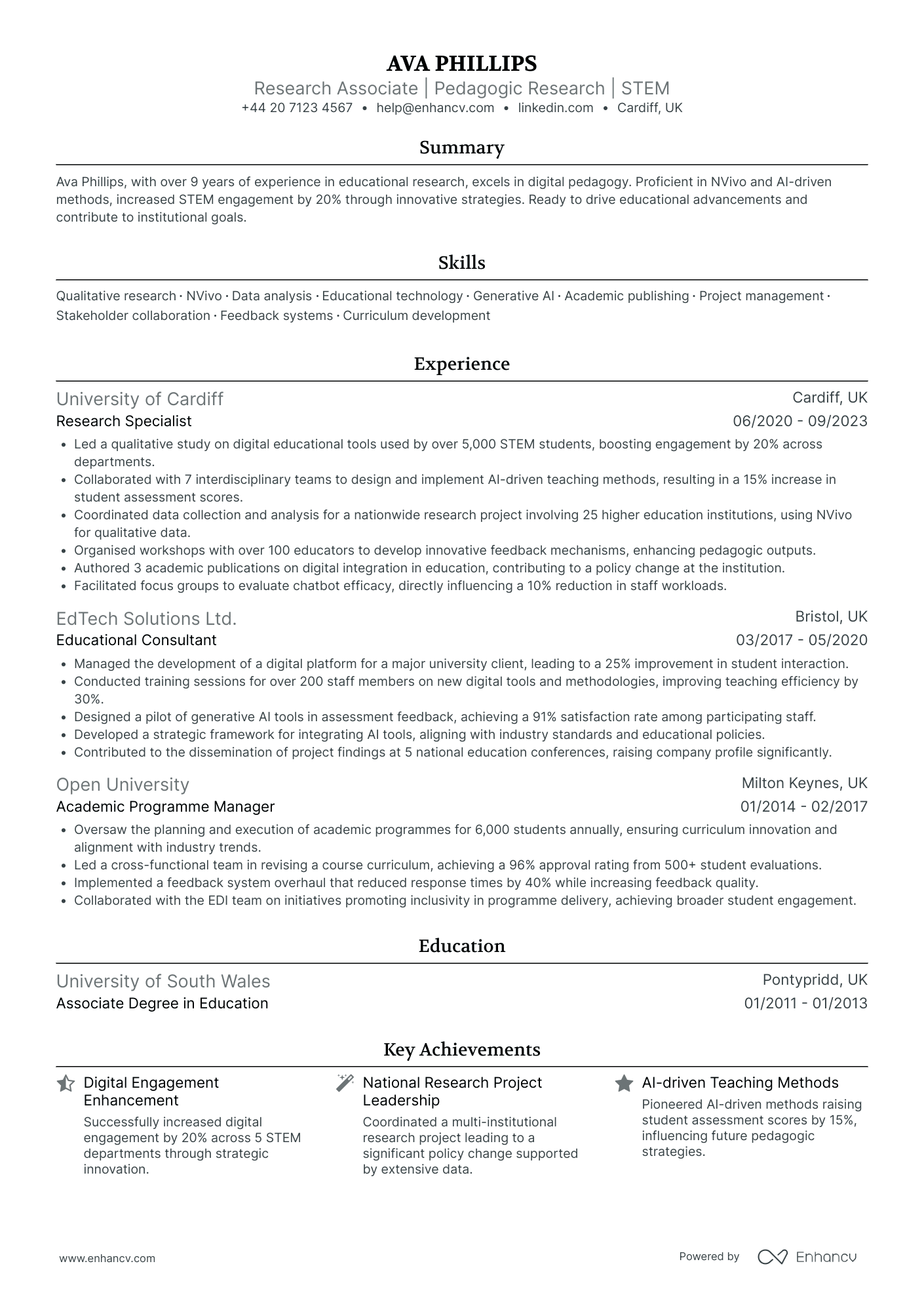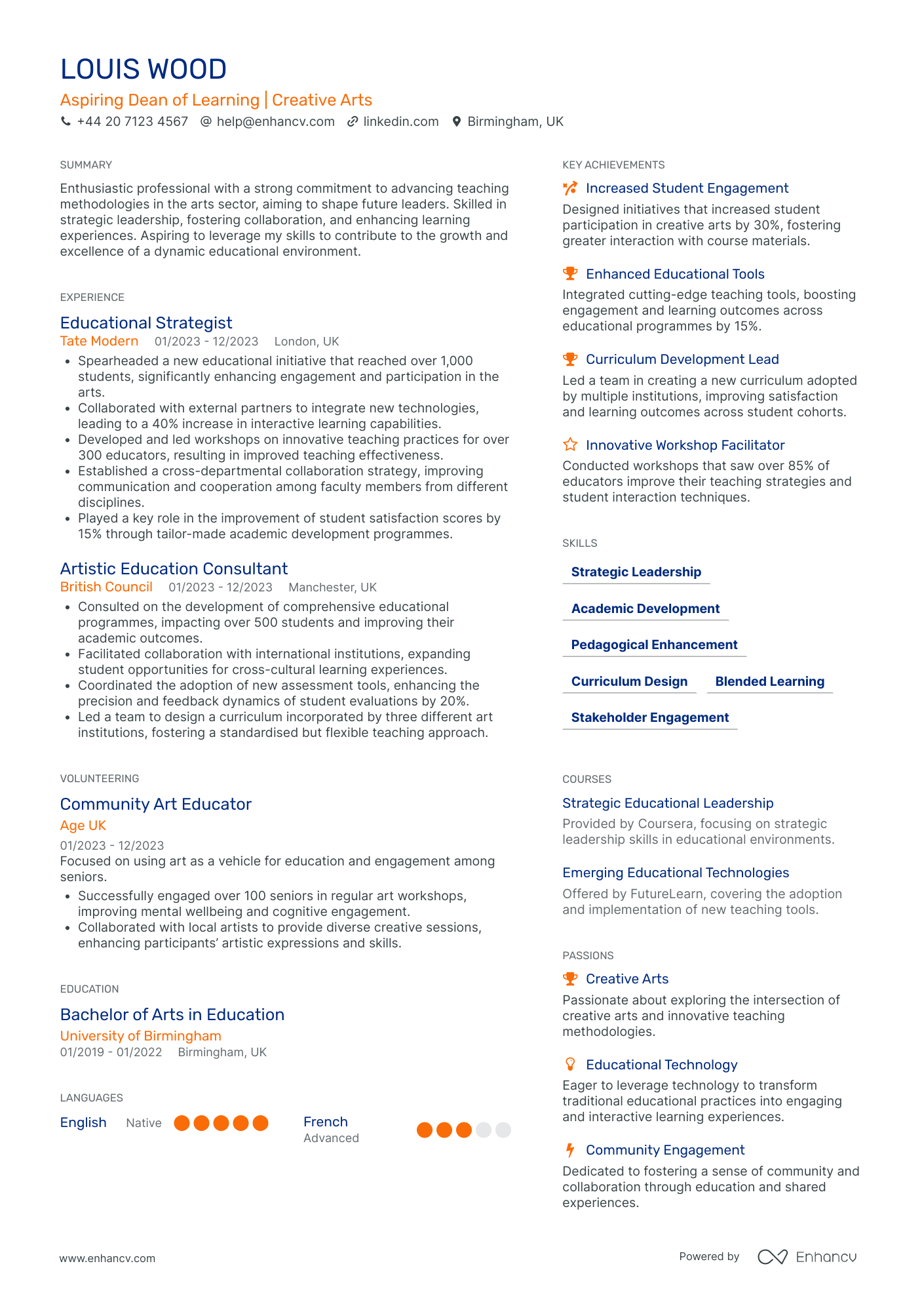Crafting a captivating CV can prove particularly challenging for college students due to limited work experience. Our guide offers pragmatic strategies to highlight your academic achievements and extracurricular activities effectively, ensuring your CV stands out to prospective employers.
- Answer job requirements with your college CV and experience;
- Curate your academic background and certificates, following industry-leading CV examples;
- Select from +10 niche skills to match the ideal candidate profile
- Write a more succinct experience section that consists of all the right details.
Do you need more specific insights into writing your college CV? Our guides focus on unique insights for each individual role:
CV examples for college
By Experience
Junior College Administrator
- Content Presentation Achieves Clarity and Structure - The CV maintains a clear and structured format that enhances readability. Sections such as Experience, Education, Skills, and Achievements are well-organized, which allows the reader to easily navigate through the qualifications and accomplishments, ensuring that important points are communicated effectively without being buried under excessive detail.
- Career Trajectory Shows Progressive Growth - Lily Cooper's career trajectory illustrates a clear progression within the construction and ventilation industry, from an Office Assistant to a Junior Estimator. This upward movement demonstrates her ability to learn and advance within her chosen field, highlighting her ambition and dedication. The logical career advancements reflect her growing expertise and responsibility in project estimation and administrative roles.
- Achievements Translate into Direct Business Impact - The CV effectively ties achievements to tangible business outcomes, enhancing their relevance. For example, a 10% reduction in material costs and a 20% reduction in project delays showcase her contributions to cost-efficiency and operational effectiveness. These achievements not only demonstrate her competence but also underline her potential to provide substantial value to prospective employers by directly contributing to business goals.
Senior College Administrator
- Structured Content Presentation - Edward Mitchell's CV is crafted with clear structure and concise language that allows easy navigation through each section. Each job role is supported by bullet points, which succinctly detail responsibilities and achievements, making it easy for potential employers to identify relevant skills and accomplishments without the need for extensive reading.
- Progressive Career Trajectory - The CV demonstrates a clear career progression from a Junior Office Coordinator to an Office Administrator. This trajectory illustrates Edward's ability to take on more complex responsibilities over time, indicating strong personal growth and a continuous pursuit of career advancement within the administrative domain.
- Notable Business Relevant Achievements - The document highlights significant achievements such as increasing project efficiency and reducing expenses, which are not only quantified by percentages but also illustrate their positive impact on business productivity and cost-effectiveness. This emphasis on outcome-oriented accomplishments enhances the CV's relevance to potential employers seeking impactful results.
Entry-Level College Admissions Officer
- Impressive career advancement and industry expertise - Louis Wood's CV clearly illustrates a progressive career trajectory, showing substantial growth from an Admissions Consultant to a Senior Admissions Officer, reflecting a deepening expertise within the education sector.
- Innovative strategies and methodologies - The CV showcases Louis's unique contributions to the field, such as designing strategic student profiles and developing a comprehensive feedback system that resulted in significant improvements in student outcomes. These elements highlight Louis's ability to apply strategic thinking and innovation in admissions processes.
- Impactful achievements with a focus on measurable results - Beyond mere numbers, Louis provides a compelling narrative on achievements, such as improving the acceptance rate by 15% and enhancing student engagement levels. These accomplishments underline not only his effectiveness but also his ability to implement solutions that lead to tangible and impactful results in the education sector.
Experienced College Career Advisor
- Career Advancement and Industry Experience - Eva Fisher's CV highlights a steady progression in her career from HR Assistant to HR Advisor within prominent companies such as Rolls-Royce and BAE Systems. This trajectory showcases her ability to grow within the human resources field while gaining versatile experience in the aerospace and defense industries, which is indicative of her adaptability and dedication to professional development.
- Analytical and Data-Driven Acumen - The CV outlines Fisher's data analysis prowess, particularly in enhancing HR reporting accuracy, which led to a 20% reduction in errors. Her focus on data-driven decision-making and implementation of new analysis methodologies illustrates a technical depth that is crucial for making informed business decisions in HR management.
- Cross-Functional Collaboration and Leadership - Eva demonstrates strong leadership through her roles in policy training and employee well-being initiatives, underscoring her soft skills. Her ability to work cross-functionally, evidenced by successful collaborations with Trade Unions and leading performance management revamps, highlights her capability to foster employee engagement and resolve conflicts efficiently.
Junior College Facilities Manager
- Clear and Structured Presentation - The CV is presented with clarity and conciseness, effectively organized into distinct sections such as work experience, education, skills, and achievements. This structured layout ensures that relevant information is easily accessible and highlights the candidate's strengths as a Facilities Manager.
- Demonstrated Career Growth - Isaac Scott exhibits a strong career trajectory, progressing from a Facilities Intern to a Facilities Manager in a relatively short time. This upward movement within the industry underscores his dedication and competence in taking on increased responsibilities while enhancing his expertise in facilities management.
- Focus on Sustainability and Cost Efficiency - A unique aspect of the CV is the emphasis on sustainability and energy efficiency, as seen in Isaac's achievements in reducing utility costs and implementing preventative maintenance strategies. These industry-specific elements underscore his commitment to environmental sustainability and operational cost savings, adding significant value to potential employers.
Senior College Sports Coach
- Clear Content Presentation - The CV is meticulously structured, offering a concise overview of Daisy Shaw's career. Headings are consistently used for easy navigation, and bullet points within each job role facilitate quick understanding of her responsibilities and achievements. This clear structure ensures that key information is accessible at a glance.
- Impressive Career Trajectory - Daisy's career path reflects significant growth and professional development, moving from a Junior Coach to a Senior Sports Coach within six years. Her roles demonstrate a steady rise in responsibilities, culminating in leadership positions that involve managing teams and implementing large-scale programs.
- Industry-Specific Expertise - The CV showcases Daisy's deep understanding of athlete development and curriculum innovation. Her skills in netball and athletics coaching, combined with cross-functional expertise in event coordination and performance analysis, highlight her as a versatile professional with the technical depth required in sports coaching.
By Role
College Admissions Officer
- Career progression and increasing responsibilities - Isabelle Reed's career trajectory is clear and impressive, marked by progressive promotions from Admissions Coordinator to Senior Admissions Officer. This demonstrates her capability for growth and her competence in handling increasing responsibilities in the field of higher education admissions.
- Effective implementation of industry-specific methodologies - Isabelle has showcased a strong grasp of admission-specific processes such as streamlining UCAS communication protocols and implementing standard operating procedures. These targeted methodologies are essential in improving efficiency and compliance within the admissions domain.
- Integration of soft skills with leadership qualities - The CV highlights Isabelle's ability to lead and collaborate with teams, manage large-scale projects, and communicate effectively with diverse stakeholders. Her leadership in orchestrating results day logistics and reducing processing errors underscores her competency in driving operational excellence and team alignment.
College Career Advisor
- Content Presentation and Organizational Clarity - The CV is structured with clear headings and succinct bullet points that allow for easy navigation of Harper Webb's professional journey. This clarity ensures that key achievements and skills are quickly identifiable, making it easy for potential employers to assess their suitability for the role.
- Diverse Career Trajectory and Growth - Harper Webb demonstrates a career trajectory marked by steady progress within the careers advisory field, advancing from a Student Support Officer to a Careers Advisor. This progression highlights their expanding responsibilities and consistent delivery on student career enhancement, showcasing a strong commitment to professional development within the industry.
- Significant Achievements with Impactful Results - The CV effectively highlights achievements with specific metrics, such as a 30% increase in student engagement and a 25% improvement in career satisfaction scores. These quantifiable results not only demonstrate Webb's impact but also underscore their ability to translate strategic initiatives into actionable, business-relevant outcomes.
College Recruitment Specialist
- Strategic Career Advancement - George Johnson's career growth is clearly defined, moving from a Recruitment Specialist to a Talent Acquisition Manager at well-known financial institutions. This trajectory demonstrates his ability to take on greater responsibilities and leadership roles in the field of recruitment and HR strategy.
- Implementation of Advanced Tools and Methodologies - George has implemented new recruitment software at HSBC and other innovative digital sourcing tools and applicant tracking systems, showcasing his technical proficiency. These implementations have significantly reduced hiring time and improved efficiency, reflecting his commitment to leveraging technology for better recruitment outcomes.
- Diversity and Community Engagement - George showcases his dedication to diversity and social equity, which is evident in his achievements. He led a diversity hiring initiative, increasing workforce representation by 20%, and is passionate about volunteerism, indicating his commitment to broader social causes beyond the confines of his job.
College Counsellor
- Strong career progression - Ivy's career trajectory is well-structured, moving from an Assistant Counsellor role to a School Counsellor, and then to a College Counsellor, showing clear professional growth and increasing responsibility within the educational sector.
- Emphasis on mental health advocacy - The CV highlights a significant emphasis on mental health advocacy by showcasing initiatives like workshops for mental health awareness and advocacy for equity in student support, demonstrating Ivy's commitment to improving student wellbeing.
- Adaptability to changing environments - Ivy demonstrated remarkable adaptability by innovating virtual counselling provisions to increase accessibility by 40% during college closures, showing her ability to pivot and maintain service continuity amidst challenges.
College Librarian
- Structured Career Progression - Sophia Brooks' CV showcases a clear and structured career trajectory with meaningful advancements, transitioning from a Librarian to a Senior Librarian while achieving significant milestones at each stage. This progression highlights her growing responsibilities and leadership roles within distinguished library institutions across the United Kingdom.
- Innovative Library Practices and Tools - The CV is remarkable for its emphasis on sophisticated library solutions, such as digitising archived documents and developing a user-friendly library app. Sophia's proficiency in integrating modern technologies manifests in improved user engagement and operational efficiencies, showcasing her technical depth in library management.
- Quantifiable Achievements with Community Impact - Notable achievements are vividly quantified, with community engagement increased by 25% and online service usage up by 40% thanks to her initiatives. These figures reflect her success in making libraries more inclusive and attractive to diverse demographics, underlining the significant societal and educational contributions of her initiatives.
College Facilities Manager
- Strategic Progression in the Facilities Domain - Eva Fisher's career trajectory is marked by a clear growth path from Maintenance Technician to Facilities Coordinator, reflecting a strategic progression in the facilities management domain. This evolution underscores her capacity to adapt, learn, and step into roles of increasing responsibility and complexity.
- Technical Acumen and Implementation of Advanced Tools - The CV highlights her expertise in CMMS (Computerized Maintenance Management Systems), showcasing her technical acumen and ability to leverage state-of-the-art tools for project coordination and maintenance management. This technical depth positions her as a knowledgeable professional within her field.
- Impactful Achievements Aligned with Business Goals - Eva's significant achievements, such as reducing repair costs by 15% and increasing work order completion by 30%, demonstrate her ability to translate technical skills into business results, enhancing operational efficiency and cost-effectiveness, which are critical to the success of facility management operations.
College Sports Coach
- Structured Presentation and Clarity - The CV is meticulously structured, with well-defined sections that make it easy to navigate through Chloe's career history, skills, education, and achievements. Each segment is clearly labeled, ensuring that the reader can easily find relevant information without sifting through excessive detail. The use of bullet points for responsibilities within job roles enhances readability and conciseness.
- Dynamic Career Growth - Chloe's career trajectory reflects a consistent progression in responsibility and leadership within the sports development industry. From her beginnings as a Community Sports Officer to her current role as Head of Sports Development, her promotions indicate a clear upward trajectory aligned with her growing expertise in strategic planning and program management. This evolution is mirrored in her increasing impact on community engagement and sports program expansion.
- Quantifiable Outcomes and Strategic Achievements - The CV highlights Chloe's ability to generate tangible business outcomes, with achievements tied to specific metrics. Her experience in securing significant funding and strategically expanding programs demonstrates her capacity to influence large-scale changes. Notably, her success in increasing student enrollment, community engagement, and participation rates is presented with specific percentage increases and engagement improvements, showcasing her effectiveness in driving impactful sports initiatives.
College Financial Aid Officer
- Clear Structure and Presentation - The CV is well-organized with clearly delineated sections for experience, education, skills, and achievements. It uses bullet points for readability and allows each segment to quickly convey relevant information. The summary encapsulates the candidate's expertise in financial aid services concisely, underscoring regulatory compliance and problem resolution focus.
- Impressive Career Growth and Role Progression - The CV outlines a clear progression from a Financial Support Administrator to a Financial Aid Officer, demonstrating growth within the education sector. Amelia's transition from ensuring funding accessibilities at Newcastle College to managing complex Title IV verifications at BPP University showcases both experience and increased responsibility, signifying robust career development.
- Utilization of Industry-Specific Tools and Methods - Highlighting proficiency with CampusNexus software and comprehensive knowledge of Title IV policies emphasizes the candidate's technical depth and industry-specific skills. These competencies are crucial for roles involving financial aid management, where precision and regulatory compliance are paramount. Such specialized knowledge complements the role’s requirements, reinforcing the candidate’s fit for a leadership position in educational services.
College Lecturer in Psychology
- Clear and Structured Presentation - The CV is exceptionally well-organized, with each section clearly delineated and easy to navigate. The use of concise bullet points under each job title aids in readability while delivering key information quickly.
- Consistent Career Growth in Education - Sophia's professional journey reflects a steady progression within the education sector, moving from an Advanced Psychology Instructor to a Psychology Lecturer, which signifies recognition of her growing expertise and leadership skills.
- Focus on Student Success and Engagement - The CV emphasizes unique methodologies aimed at enhancing student performance, such as integrating feedback systems and organizing extracurricular activities, showcasing Sophia's dedication to improving academic outcomes.
College Lecturer in Computer Science
- Structured and Concise Presentation - The CV is structured in a clear and concise manner, providing a comprehensive overview of the candidate's qualifications. Sections are organized logically, making it easy to navigate through information such as experience, education, skills, and achievements, and ensuring that each area is covered succinctly.
- Progressive Career Trajectory - Isabella Watson's career demonstrates consistent growth, moving from an Assistant Lecturer to a Senior Lecturer. This upward trajectory reflects her increasing responsibilities and expertise, particularly in the areas of AI and cybersecurity, while also underlining her capability to lead both academically and administratively.
- Impactful Achievements with Business Relevance - The CV highlights several key achievements that greatly contribute to the candidate's business relevance. These include securing £500k in research funding, which enhances the department's research capabilities and stature, as well as successfully implementing a hybrid teaching model that improved student resource access by 40%, showcasing her impact on educational innovation and student satisfaction.
College Lecturer in Mathematics
- Structured and Engaging Presentation - The CV is well-organized with clear sections, making it easy to navigate. The use of bullet points in the experience section allows for quick absorption of key details and achievements, ensuring that the reader can quickly understand the candidate's expertise and contributions in their roles.
- Consistent Career Progression in Education - The candidate's career trajectory shows a clear progression within the field of mathematics education. Starting from a Mathematics Teacher to a Mathematics Instructor and advancing to a Senior Mathematics Lecturer demonstrates not only growth and promotions but also a deepening specialization in vocational education and student engagement.
- Integration of Technology in Education - The CV highlights the candidate's innovative approach to teaching by integrating digital tools into the curriculum. This includes leading projects that significantly enhanced student engagement and learning outcomes, which is particularly relevant in the current educational landscape focused on online and hybrid learning environments.
College Lecturer in English Literature
- Clear and Structure-Oriented Presentation - Ava Phillips’ CV is structured to provide a seamless flow of information. The use of headers and bullet points organizes her extensive experience and credentials in a digestible form. Each section, from career history to education, is concisely presented, allowing quick identification of key skills and achievements without overwhelming the reader.
- Progressive Career Trajectory in Education - Ava's career shows a clear upward trajectory from a secondary school teacher to an A-Level lecturer, demonstrating her growth and increasing responsibilities. Her transition into leadership roles such as curriculum development reflects her ability to adapt and excel in higher educational settings, showcasing a commitment to lifelong learning and professional advancement.
- Innovative Educational Methodologies - Ava's approach to educational technology and curriculum development is a standout component of her CV. She effectively leverages digital platforms for remote learning and tailors educational methodologies like interactive and multimedia content to enhance student engagement, which is particularly important as education moves towards more digital integration.
College Research Associate
- Structured and Concise Presentation - The CV is neatly structured, making use of sections such as experience, skills, education, and achievements that are clearly defined. This clarity ensures that potential employers can easily navigate through Ava Phillips' qualifications and swiftly identify key strengths.
- Nuanced Career Development - Ava's career trajectory displays a logical and impressive growth pattern, starting from an Academic Programme Manager to a Research Specialist. Her progression reflects a deepening of expertise in pedagogic research and a consistent focus on enhancing educational methodologies.
- Integration of AI and Technology - The CV demonstrates Ava's adeptness with industry-specific tools like NVivo and generative AI methods. Her work emphasizes cutting-edge methodologies in education, illustrating a technical depth that is invaluable for modern research initiatives in STEM education.
College Dean of Students
- Clarity and Structure in Content Presentation - The CV showcases a well-organized presentation, with a clear delineation of sections that effectively highlights the candidate’s career journey and skills. Key sections such as experience, education, skills, and achievements are concise and easy to navigate, allowing quick comprehension of the candidate's qualifications.
- Robust Career Trajectory and Industry Shifts - Louis Wood’s career path illustrates significant growth in the educational sector, transitioning from roles focused on strategy within prestigious institutions like the Tate Modern to consultancy with the British Council. This progression underscores his expanding influence in educational innovation and leadership.
- Significant Achievements with Business Impact - The CV powerfully details achievements with tangible impacts such as a 30% increase in student engagement and a 15% improvement in student satisfaction. These metrics reflect Wood’s effectiveness in implementing successful educational strategies that substantially benefit stakeholders and enrich the learning environment.
Structuring your college CV layout: four factors to keep in mind
There are plenty of best practices out there for your CV layout and design. At the end of the day, a clear format and concise CV message should be your top priority. Use your CV design to enhance separate sections, bringing them to the forefront of recruiters' attention. At the same time, you can write content that:
- Follows the reverse chronological order in the experience section by first listing your most recent jobs;
- Incorporates your contact information in the header, but do skip out on the CV photo for roles in the UK;
- Is spotlighted in the most important sections of your CV, e.g. the summary or objective, experience, education, etc. to show just how you meet the job requirements;
- Is no longer than two-pages. Often, the one-page format can be optimal for your college CV.
Before submitting your CV, you may wonder whether to export it in Doc or PDF. With the PDF format, your information and layout stay intact. This is quite useful when your CV is assessed by the Applicant Tracker System (or the ATS) . The ATS is a software that scans your profile for all relevant information and can easily understand latest study on the ATS , which looks at your CV columns, design, and so much more.

PRO TIP
Use font size and style strategically to create a visual hierarchy, drawing the reader's eye to the most important information first (like your name and most recent job title).

The top sections on a college CV
- Education history shows academic achievements.
- Relevant coursework indicates specialised knowledge.
- Internship experience demonstrates practical skills.
- Extracurricular activities reflect soft skills.
- Skills section highlights applicable abilities.

What recruiters value on your CV:
- Highlight leadership experiences within student organisations or community service projects, demonstrating an ability to take initiative and contribute to college life.
- Emphasise academic achievements, such as high grades, scholarships, or involvement in research projects that are relevant to the college's curriculum and ethos.
- Include personal projects or interests that align with the college's values or mission statement, showing a natural fit with the institution's culture.
- Detail any relevant work experience, internships, or volunteering that shows a commitment to your chosen field of study and a proactive approach to gaining practical knowledge.
- Showcase soft skills, such as communication, teamwork, and time management by providing examples from extracurricular activities, as colleges value well-rounded students.
Recommended reads:
Tips and tricks on writing a job-winning college CV header
The CV header is the space which most recruiters would be referring most often to, in the beginning and end of your application. That is as the CV header includes your contact details, but also a headline and a professional photo. When writing your CV header:
- Double-check your contact details for spelling errors or if you've missed any digits. Also, ensure you've provided your personal details, and not your current work email or telephone number;
- Include your location in the form of the city and country you live in. If you want to be more detailed, you can list your full address to show proximity to your potential work place;
- Don't include your CV photo, if you're applying for roles in the UK or US, as this may bias initial recruiters' assessments;
- Write a professional headline that either integrates the job title, some relevant industry keywords, or your most noteworthy achievement.
In the next part of our guide, we'll provide you with professional CVs that showcase some of the best practices when it comes to writing your headline.

Examples of good CV headlines for college:
Marketing Specialist | Consumer Engagement | SEO & Analytics | CIM Certified | 3+ Years
Software Engineer | Full Stack Development | Agile Methodologies | BSc Computer Science | 5 Years Experience
Financial Analyst | Risk Management | Data Interpretation | CFA Level 1 | 2 Years in Finance
Biomedical Research Assistant | Cell Biology | Laboratory Techniques | MRes Biomedical Science | 4 Years' Lab Experience
Project Manager | Infrastructure Projects | Prince2 Practitioner | 6 Years Leading Teams
HR Coordinator | Talent Acquisition | Employee Relations | CIPD Qualified | 1 Year in Human Resources
Choosing your opening statement: a college CV summary or objective
At the top one third of your CV, you have the chance to make a more personable impression on recruiters by selecting between:
- Summary - or those three to five sentences that you use to show your greatest achievements. Use the CV summary if you happen to have plenty of relevant experience and wish to highlight your greatest successes;
- Objective - provides you with up to five sentences to state your career goals and aspirations

CV summaries for a college job:
``` CV objectives for a college job:
- Seeking to utilize comprehensive understanding of data analysis and machine learning, honed from rigorous academic coursework and personal projects, to contribute to the cutting-edge research team at Silicon Insights Corp.
- Eager to apply in-depth knowledge of marketing strategies, social media management, and brand development acquired from a dedicated university program to elevate brand engagement for Mediterranean Fashions.
- Aiming to leverage strong foundation in environmental science and passion for sustainability to assist the Green Earth Initiatives in combating climate change through impactful conservation projects.
- Aspiring to deploy adept skills in graphic design and creative software proficiency towards the artistic endeavors of Pixel Perfect Media, enriching visual communication and audience experience.
- Intent on bringing robust coding skills, expertise in cybersecurity, and a keen interest in software development to the innovative tech team at CyberSolutions Inc.
- Dedicated to merging a solid foundation in financial analysis with a keen eye for detail to support the fiscal integrity and growth of Metro Bank's investment division.
How to ensure your college CV stands out when you have no experience
This part of our step-by-step guide will help you substitute your experience section by helping you spotlight your skill set. First off, your ability to land your first job will depend on the time you take to assess precisely how you match the job requirements. Whether that's via your relevant education and courses, skill set, or any potential extracurricular activities. Next:
- Systematise your CV so that it spotlights your most relevant experience (whether that's your education or volunteer work) towards the top;
- Focus recruiters' attention to your transferrable skill set and in particular how your personality would be the perfect fit for the role;
- Consider how your current background has helped you build your technological understanding - whether you've created projects in your free time or as part of your uni degree;
- Ensure you've expanded on your teamwork capabilities with any relevant internships, part-time roles, or projects you've participated in the past.
Recommended reads:

PRO TIP
If you have received professional endorsements or recommendations for certain skills, especially on platforms like LinkedIn, mention these to add credibility.
Key college CV skills: what are hard skills and soft skills
Let's kick off with the basics. You know that you have to include key job requirements or skills across your CV. For starters, take individual skills from the job description and copy-paste them into your CV, when relevant. Doing so, you'll ensure you have the correct skill spelling and also pass the Applicant Tracker System (ATS) assessment. There are two types of skills you'll need to include on your CV:
- Hard skills - technical abilities that are best defined by your certificates, education, and experience. You could also use the dedicated skills section to list between ten and twelve technologies you're apt at using that match the job requirements.
- Soft skills - your personal traits and interpersonal communication skills that are a bit harder to quantify. Use various CV sections, e.g. summary, strengths, experience, to shine a spotlight on your workspace achievements, thanks to using particular soft skills.
Remember that your job-winning CV should balance both your hard and soft skills to prove your technical background, while spotlighting your personality.
Top skills for your college CV:
Research
Academic Writing
Time Management
Critical Thinking
Data Analysis
Technical Proficiency
Project Management
Subject Matter Expertise
Presentation Skills
Statistical Analysis
Adaptability
Teamwork
Communication
Problem-Solving
Leadership
Work Ethic
Interpersonal Skills
Organisational Skills
Creativity
Attention to Detail

PRO TIP
Order your skills based on the relevance to the role you're applying for, ensuring the most pertinent skills catch the employer's attention first.
Further professional qualifications for your college CV: education and certificates
As you're nearing the end of your college CV, you may wonder what else will be relevant to the role. Recruiters are keen on understanding your academic background, as it teaches you an array of hard and soft skills. Create a dedicated education section that lists your:
- applicable higher education diplomas or ones that are at a postgraduate level;
- diploma, followed up with your higher education institution and start-graduation dates;
- extracurricular activities and honours, only if you deem that recruiters will find them impressive.
Follow a similar logic when presenting your certificates. Always select ones that will support your niche expertise and hint at what it's like to work with you. Balance both technical certification with soft skills courses to answer job requirements and company values. Wondering what the most sought out certificates are for the industry? Look no further:

PRO TIP
If there's a noticeable gap in your skillset for the role you're applying for, mention any steps you're taking to acquire these skills, such as online courses or self-study.
Recommended reads:
Key takeaways
Here are five things you need to remember about writing your college CV for success:
- Sort your experience based on the reverse chronological order, starting with your most recent career items, to showcase how you've grown your career;
- Include within your CV header your relevant contact details, a headline that could spotlight your unique value, and a photo - if you're applying for roles outside the UK or US;
- Decide to use the CV summary, if you happen to have more professional experience, and an objective, if you want to showcase your career goals;
- Within the experience section, write your bullets using action verbs, skills, and success, instead of just merely listing your on-the-job responsibilities;
- Prove your technical skills, using your education and certificates, and your soft skills, with your achievements and strengths sections.
